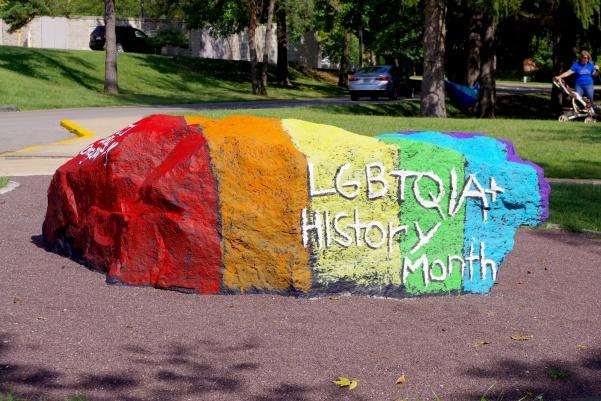Student organizations express concern on diversity at Lindenwood
Photo by Kat Owens
The Lion Pride rock painted by Genders/Sexualities Alliance in 2018.
April 4, 2021
Three top Lindenwood officials have agreed to meet with students after several students sent angry letters about the university’s handling of diversity and inclusion matters.
Included among the students’ concerns was a lack of communication regarding the resignation of the coordinator of the Center of Diversity and Inclusion two weeks ago. Jennifer Spellazza resigned from the post after learning the position was going to be changed.
Her coordinator position will be elevated to the new chief diversity officer position in the Center.
The students’ other concerns included what they see as a lack of support for national diversity issues, including Black Lives Matter. And the students expressed frustration at having little diversity among faculty, staff and administration.
Interim Dean of Students Kelly Moyich said in an email interview on April 1, that she, President John Porter, and Senior Vice President of Enrollment Management and Student Engagement Terry Whittum are meeting with the presidents of two student groups — Genders and Sexualities Alliance, and Black Student Union — Tuesday, April 6, to discuss the students’ concerns.
The meeting was scheduled after students from the two groups sent letters to Porter’s office which expressed frustration at not being informed and the lack of effort at progressing equality and diversity on campus.
Some of the concerns were regarding the Center of Diversity and Inclusion, which is located on the third floor of Evans Commons. The Center is dedicated to enhancing campus lives of students from under-represented groups like international, LGBTQ+, and disabled students.
GSA President Saralinda Twente said that students in the CDI were not informed of the resignation until the last minute.
The letter from GSA said that the Center was a beacon for students who struggle to feel at home at Lindenwood.
“The lack of preparedness pursuant to the decision to terminate this position is confirmation that Lindenwood does not value us, and struggles to prioritize diversity, equity, and inclusion. There are countless other examples to back this up; this is merely the icing on the cake,” the letter read.
The letter from BSU was also in response to the CDI position being terminated, but the organization re-sent their letter from last summer that expressed disappointment at the university refraining to publicly support Black Lives Matter.
“Today’s letter is in direct response to the recent, unannounced, thoughtless change/termination of the CDI staff position. You and your team eliminated this position with NO clear path of communication, and no interim plan to staff that office while you do whatever you are going to do with the CDI. You shut down this position, and in so doing, you shut down, one week and counting, what the CDI did for this institution,” the letter read.
The letter also made demands like meeting with Porter every three months, requiring implicit bias training for all administrators, requiring all majors to take African American studies, and seeing more black representation in Lindenwood’s faculty.
While both letters from the student organizations were written to Porter demanding a 24- to 48- hour reply, the response was from Whittum and Moyich 72 hours later.
The response letter said the new chief diversity officer position will assist in leading diversity initiatives for Lindenwood and work with the Title IX coordinator in assisting with complaints of discrimination, harassment and/or retaliation and managing the day-to-day operations of the CDI.
The letter also said the abrupt departure of Spallazza disappointed the administration as well, but assured students they will continue to devote efforts to the CDI.
“Last week, Ms. Moyich and Ms. Bucci met with the CDI staff and assured them that Lindenwood is committed to finishing the academic year in the CDI strong despite this departure. We intend to continue with any scheduled training and assist students with on-going projects,” the letter read.
In an email interview, Moyich said that there wasn’t a termination, but a resignation without notice.
“All CDI student workers have had an opportunity to connect with the CDI assistant, the Student Affairs administrative assistant and myself to assist with any on-going projects or planned events,” Moyich said in an email. “The CDI remains a safe space for all community members to connect and receive resources to enhance the campus experience.”
Twente said the issue is that there was no communication with the students or no direct plan laid out to fill the position that is crucial to minorities at Lindenwood.
Emmett Manzer, president of Alpha Phi Omega, said the response letter was “gaslighting” them.
“It’s ridiculous coming from the Title IX office, they know better,” Manzer said. “And honestly I was so disturbed. I honestly left work today, because I was horrified that that came from our Title IX office, and honestly I don’t know how I would ever go to an office after that.”
Manzer said in the letter, resources were listed in case they needed to reach out, but Manzer said the whole point of sending the administration a letter was to emphasize that they don’t have resources to begin with.
Cece Connelly, vice president of GSA, said while the university did answer some concerns for the future of the CDI, the response was a reflection of the university’s values.
“We’re very diverse and we want to make sure everyone is included,” Connelly said. “We want to promote equity. But that’s not showcased in the actions that the university is taking.”
Connelly said the CDI was the safest place on campus for anyone not in the majority. Connelly said this is her first semester of being out as a transgender woman. The CDI was the first place she went to make sure her name appeared correctly on documents.
“Anything in relation to my transition that is the place that I would go,” Connelly said. “I do not have that place right now.”
Robby X. Hamilton, president of BSU, said that the university will preach about diversity but will not listen to them. He said it feels like a “slap in the face” when they won’t agree to a meeting to discuss these issues but send blanket emails to appease the students.
“And a lot of times what they’ll do is they’ll create these focus groups or whatever they call them. It’s just a lot of empty words — a lot of empty conversations but nothing tangible will come about. And I think the biggest thing that bothers me is that they won’t have a meeting with us,” Hamilton said.
Hamilton said if the university loves what makes it so diverse, the administration should try to appease that community. He said the next step moving forward should be listening to marginalized groups.
“You need to speak to the people whom you’re trying to assist in, or at least you should be trying to make them more comfortable, especially when we’re giving you our money for this education,” Hamilton said.
Heather Brown-Hudson, professor of Gender Studies at Lindenwood and GSA adviser, said that the students weren’t upset about the termination of the CDI position, but were upset at the thoughtlessness behind it.
“They [the administration] didn’t really understand that there were a lot of people that relied on the presence of that staff person, and they were working on some really important things that would affirm their existence there at Lindenwood,” Brown-Hudson said.
Brown-Hudson said that she’s been here for 11 years, and the administration has always been reactive instead of proactive on commenting on national social issues.
“I don’t have enough fingers and toes to count the times that, as a member as a prior member of the Diversity, Equity and Inclusion Task Force, I would ask for statements when something horrific has happened. There’s been two mass shootings in the last week in the United States, and they just couldn’t get it together,” Brown-Hudson said.
Brown-Hudson said she’s disappointed the university can go through provosts and presidents “like nobody’s business” but have yet to change the way they handle DEI initiatives.
“I want my president to have compassion and humility and actually care about Black Lives, instead of just putting them on the brochures- instead of putting the black students that we have on campus, on our website,” Brown-Hudson said. “How about we actually say that the words “Black Lives Matter” so my job as a professor and my job as an advisor of the GSA is to address my students individual and collective objectives and get out of their way and help them to do it right.”
She said she’s asked Porter to do safezone and implicit bias trainings, and did not receive a straight-forward reply.
“It’s Groundhog Day. No matter the administration, no matter the president the turnovers, the reorganization, the issue remains the same that Lindenwood does not appear to prioritize any real change. I know that the faculty staff and students remain disappointed,” Brown-Hudson said.
Brown-Hudson said that the university creating a new chief diversity officer position for the CDI was the right move, but not communicating to students, faculty, and staff about how the office would continue to function was traumatizing.
She said communication with the administration would be beneficial.
“I think what would go a long way is if the administration actually could sit down there and hear them out and really listen and then make a plan- and I don’t mean a strategic plan that’s 10 years out, I mean they need to listen and respond to their specific needs right now,” Brown-Hudson said.
Brown-Hudson said the university doesn’t need small changes anymore but big ones to work toward diversity, equity, and inclusion.
“We don’t need a little change,” Brown-Hudson said. “We need someone to quickly turn around statements, we need an administration that affirms all students, we need some better conditions for our internationals.
“Really great stuff in the last 10 years at Lindenwood, but the changes were made by the blood sweat and tears of the students, staff and faculty. None of these ideas were from above.”
Brown-Hudson said there are some things that Lindenwood has changed over time that has made her proud, like the policy of non-discriminiation now enforced on campus. This includes gender identity, sexual orientation, and disabilities.
She said there are other safe spaces and resources on campus for these students, like the counseling center. She said it’s important to have safe spaces for these students but also an open administration.
“It’s not only about spaces but it’s also about the board. What do we have on the board, what kinds of interests do they have, what are our hiring practices, what’s our diversity initiatives for hiring more diverse faculty and offering more diverse curricula?” Brown- Hudson said.
Moyich said in an email that the Center for Diversity and Inclusion fosters a culture of belonging and continues to offer resources. Trainings are offered throughout the year to students, faculty, and staff, and the Little Pantry operates for community members to take what they need.
Moyich said a team of campus partners are currently assisting with determining qualities and characteristics necessary for the chief diversity officer position.
“Along with identifying qualifications, this team will assist in interviewing candidates. We welcome any interested parties within our community to nominate a candidate or apply for the position,” Moyich said.










